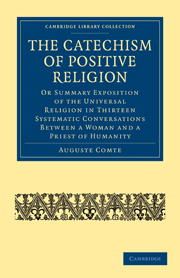 The Catechism of Positive Religion
The Catechism of Positive Religion Book contents
- Frontmatter
- PREFATORY NOTE TO THIRD EDITTON
- Contents
- PREFACE
- POSITIVIST LIBRARY
- HINT TO THE READER
- INTRODUCTION
- First Part EXPLANATION OF THE WORSHIP
- Second Part EXPLANATION OF THE DOCTRINE
- CONVERSATION VI The Doctrine as a Whole
- CONVERSATION VII The External Order, first Inorganic, then Vital
- CONVERSATION VIII The Human Order, first Social, then Moral
- Third Part EXPLANATION OF THE REGIME, OR SYSTEM OF LIFE
- CONCLUSION: GENERAL HISTORY OF RELIGION
- TABLES
CONVERSATION VIII - The Human Order, first Social, then Moral
Published online by Cambridge University Press: 05 October 2010
- Frontmatter
- PREFATORY NOTE TO THIRD EDITTON
- Contents
- PREFACE
- POSITIVIST LIBRARY
- HINT TO THE READER
- INTRODUCTION
- First Part EXPLANATION OF THE WORSHIP
- Second Part EXPLANATION OF THE DOCTRINE
- CONVERSATION VI The Doctrine as a Whole
- CONVERSATION VII The External Order, first Inorganic, then Vital
- CONVERSATION VIII The Human Order, first Social, then Moral
- Third Part EXPLANATION OF THE REGIME, OR SYSTEM OF LIFE
- CONCLUSION: GENERAL HISTORY OF RELIGION
- TABLES
Summary
The Woman.—Before we enter on the highest province of science, I should, my father, submit to you a general difficulty, the outcome of the metaphysical objections I have often heard urged against this capital extension of the Positive doctrine. Any subjection of social and moral phenomena to invariable laws, similar to those of life and matter, is now represented, by certain reasoners, as incompatible with the liberty of man. Though these objections have always seemed to me purely sophistical, I never knew how to break their force with the minds, still too numerous, which let them thus act as a check on their instinctive tendency towards Positivism.
The Priest.—It is easy, my daughter, to overcome this preliminary difficulty, by a direct definition of true liberty.
Far from being in any way incompatible with the order of things, it consists throughout in obeying without hindrance the laws applicable to the case under consideration. When a body falls, it shows its liberty by moving, according to its nature, towards the centre of the earth, with a velocity proportionate to the time, unless the interference of a fluid modify its natural action. So, in the vital order, every vegetative or animal function is said to be free, if it is performed according to the laws applicable to it, without any hindrance from within or from without.
- Type
- Chapter
- Information
- The Catechism of Positive ReligionOr Summary Exposition of the Universal Religion in Thirteen Systematic Conversations between a Woman and a Priest of Humanity, pp. 159 - 187Publisher: Cambridge University PressPrint publication year: 2009First published in: 1891


